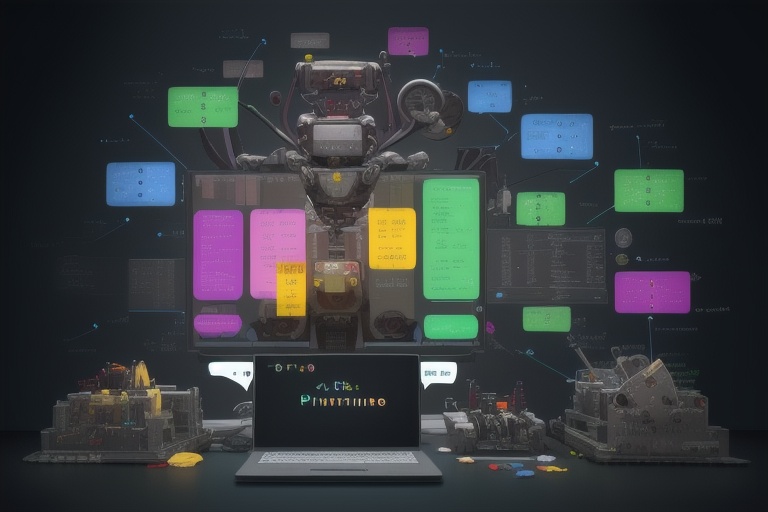Artificial intelligence (AI) has made a remarkable impact across numerous industries, revolutionizing the ways we live and work. At the heart of this revolution is the goal of enhancing efficiency, expanding reach, and delivering a wider array of products and services. As AI continues to be at the forefront of technological evolution, it's exemplified by bold moves such as Microsoft's substantial investment in OpenAI, creators of the groundbreaking ChatGPT. This pace of development, while impressive, also ushers in a host of risks that must not be overlooked.
Artificial intelligence (AI) has made a remarkable impact across numerous industries, revolutionizing the ways we live and work. At the heart of this revolution is the goal of enhancing efficiency, expanding reach, and delivering a wider array of products and services. As AI continues to be at the forefront of technological evolution, it's exemplified by bold moves such as Microsoft's substantial investment in OpenAI, creators of the groundbreaking ChatGPT. This pace of development, while impressive, also ushers in a host of risks that must not be overlooked.
Understanding the Implications of Deepfakes and Misinformation
The ability of AI to produce deepfakes—convincing computer-generated images or videos where the line between reality and fabrication blurs—is one of the most disconcerting developments. These manipulations have not only the capacity to mislead through false news but also to cause harm in more personal arenas such as revenge pornography. The overarching problem of misinformation, heightened by AI's convincingly fabricated content, brings forth deep societal, political, and legal challenges that demand comprehensive regulatory approaches.
Privacy in the Age of AI
Privacy stands on the frontlines of AI's ethical battlegrounds. Data is the fuel AI systems require, often necessitating the use of personal information, which raises critical questions about privacy invasion. Technologies like facial recognition and computer vision further deepen privacy concerns. In the wrong hands, they potentially enable constant surveillance and behavioral control, hinting at a dystopian reality if not managed with strict ethical oversight.
AI and the Future of Employment
The conversation around job displacement fueled by AI and automation remains divisive among experts. On one hand, there's the stark projection that AI automation might lead to the loss of 85 million jobs by 2025, presenting a grim picture for workers in sectors vulnerable to automation, such as transport with autonomous vehicles. Conversely, AI is also projected to create 97 million new jobs in the same timeframe, highlighting its paradoxical role as both a disruptor and a creator of opportunities. It's worth noting that jobs demanding empathy, creativity, and other uniquely human traits stand a better chance of weathering the storm of AI disruption.
Navigating the Landscape of AI-Driven Cybersecurity
As AI weaves itself more tightly into the digital fabric of our existence, it also redefines the realm of cybersecurity. The prospect of AI-powered cyber threats looms large and necessitates a fortified response to ensure that integrated AI systems remain secure against sophisticated threats.
Addressing Bias and the Concentration of AI Power
Another area of significant concern is the potential for AI to perpetuate bias and discrimination. Often, AI's decision-making algorithms are only as unbiased as the data they're trained on. This can inadvertently result in reinforcement of existing societal biases unless actively countered. Additionally, the concentration of power in a few dominant AI entities, combined with the opacity of their algorithms, raises alarms about ethical conduct and accountability.
Mitigating AI Risks for a Better Future
To responsibly harness AI’s potential, we must develop robust regulations and ethical guidelines, steering its application toward the greater good. Combatting deepfakes and misinformation, safeguarding privacy, skillfully navigating job market transformations, minimizing biases, and bolstering cybersecurity defenses stand as pillars of a world where AI serves humanity constructively.
Navigating the fast-changing landscape of AI is both thrilling and daunting. It requires a delicate balance between exploring new horizons and ensuring safety, equity, and respect for privacy. As AI capabilities expand, it becomes more urgent to proactively prepare for the varied implications of its widespread adoption. By doing so, we can embrace the transformative power of AI, while upholding values that protect individuals and society. This endeavor is not just about technological foresight, but equally about fostering a culture of ethical awareness and preparedness for the AI-driven future.
The path ahead for AI is one of intrepid innovation mingled with cautious optimism. We are on the cusp of an era where AI's fullest potentials can be realized, provided that we navigate these complexities with wisdom and foresight. By embracing a comprehensive, ethically guided approach, we can ensure that AI propels us toward a future marked by progress, security, and inclusive growth. The key lies in collective vigilance and collaboration among stakeholders to shape an AI landscape where innovation thrives alongside an unwavering commitment to ethical imperatives.
Information for this article was gathered from the following source.




